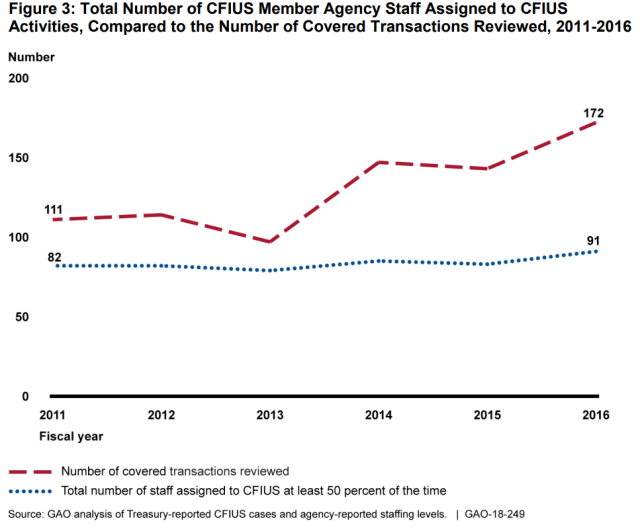Foreign Investment and National Security
 Federal officials said that the complexity of CFIUS reviews has also increased in recent years, and that additional time and staff have been required to complete these reviews. For instance, one official told us that reviews of transactions from companies that use new and emerging technologies, such as artificial intelligence and robotics, typically require extra time and attention.
The future
Federal officials said they are worried that CFIUS staff levels may not be able to keep up with an increasing (and increasingly complex) workload.
We recommended that Treasury get a better understanding of the staffing levels needed to address the current and projected CFIUS workload. Without this information, CFIUS may be limited in its ability to make recommendations to allow or block transactions that threaten national security.
Want to know more? Check out the full report.
Federal officials said that the complexity of CFIUS reviews has also increased in recent years, and that additional time and staff have been required to complete these reviews. For instance, one official told us that reviews of transactions from companies that use new and emerging technologies, such as artificial intelligence and robotics, typically require extra time and attention.
The future
Federal officials said they are worried that CFIUS staff levels may not be able to keep up with an increasing (and increasingly complex) workload.
We recommended that Treasury get a better understanding of the staffing levels needed to address the current and projected CFIUS workload. Without this information, CFIUS may be limited in its ability to make recommendations to allow or block transactions that threaten national security.
Want to know more? Check out the full report.
- Questions on the content of this post? Contact Kimberly Gianopoulos at gianopoulosk@gao.gov or Marie A. Mak at makm@gao.gov.
- Comments on GAO’s WatchBlog? Contact blog@gao.gov.

GAO's mission is to provide Congress with fact-based, nonpartisan information that can help improve federal government performance and ensure accountability for the benefit of the American people. GAO launched its WatchBlog in January, 2014, as part of its continuing effort to reach its audiences—Congress and the American people—where they are currently looking for information.
The blog format allows GAO to provide a little more context about its work than it can offer on its other social media platforms. Posts will tie GAO work to current events and the news; show how GAO’s work is affecting agencies or legislation; highlight reports, testimonies, and issue areas where GAO does work; and provide information about GAO itself, among other things.
Please send any feedback on GAO's WatchBlog to blog@gao.gov.
